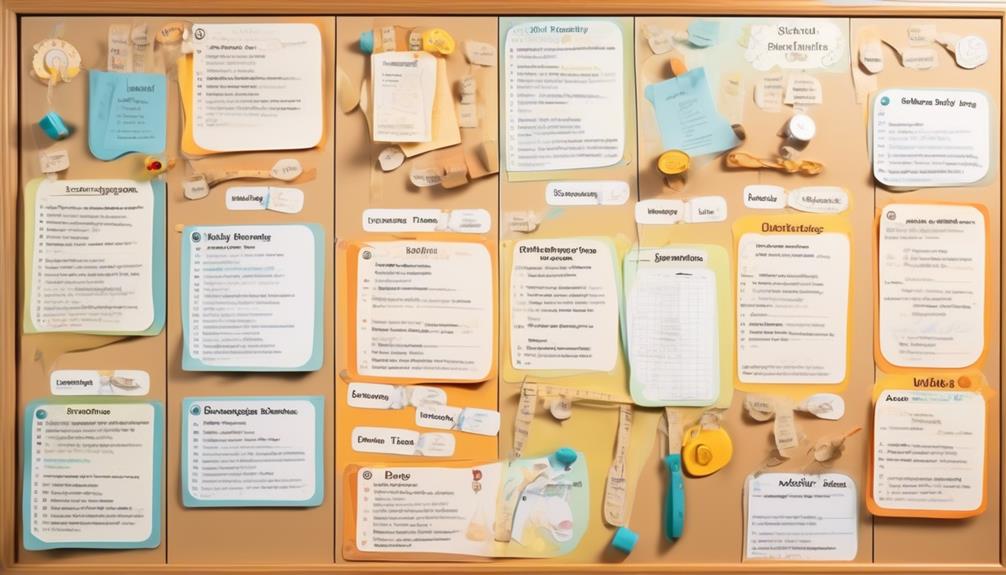Dealing with dementia behavior at home can be as challenging as trying to find your way through thick fog. But with 15 effective strategies, we can help light the way forward, offering hope for caregivers and those impacted.
From identifying triggers to fostering engagement and seeking professional support, these strategies offer a holistic approach to creating a supportive environment.
Join us as we explore the tools and techniques that can make a significant difference in the lives of those affected by dementia.
Key Takeaways
- Minimize noise and distractions, and utilize calming music and soft lighting.
- Create a safe and organized environment to reduce rummaging and hiding habits.
- Develop personalized care plans and utilize music therapy for anger and aggression management.
- Validate experiences, create a calm environment, and use distraction techniques for hallucinations and suspicion.
Identifying Triggers for Behavior Changes
When observing a loved one with dementia, it's crucial to pay close attention to their body language and expressions in order to understand their feelings and emotions. Individuals with dementia may not always be able to communicate their needs verbally, making it essential to be attuned to non-verbal cues. By observing these subtle signs, caregivers can begin to identify triggers for behavior problems that the person may be experiencing.
These triggers could be as simple as hunger, thirst, or discomfort, which, when addressed promptly, can alleviate potential behavioral challenges.
To effectively manage behavior problems in individuals with dementia, it's important to create a supportive environment that caters to their specific needs. Modifying the surroundings to be calming and comforting can help reduce agitation and confusion. Additionally, reflecting on our own reactions to their behaviors is key. Our responses can influence how they react, so remaining patient and understanding is crucial in these situations.
Creating a Calming Environment

When creating a calming environment for someone with dementia, it's crucial to minimize noise and distractions, opt for soft lighting, and place familiar objects strategically.
These adjustments can help reduce anxiety and create a peaceful atmosphere, promoting relaxation and comfort. By implementing these techniques, we aim to provide a soothing space that supports the individual's well-being and overall sense of security.
Noise Reduction Techniques
To create a calming environment at home for individuals with dementia, reducing noise levels is essential to promote relaxation and comfort. Noise reduction techniques play a crucial role in helping to reduce anxiety and confusion in individuals with dementia.
Here are some effective strategies:
- Utilize calming music: Playing soft and soothing music can help create a tranquil atmosphere.
- Minimize background noise: Turn off TVs, radios, and other sources of loud sounds to reduce distractions.
- Provide a gentle touch: Physical touch can be comforting and reassuring for individuals experiencing distress.
Soft Lighting Choices
Soft lighting choices play a crucial role in creating a calming environment for individuals with dementia, promoting relaxation and comfort within the home. When managing dementia-related behavior challenges, it's essential to consider the impact of the environment on their well-being.
Opting for warm, gentle lighting instead of bright fluorescent lights can help maintain a sense of calm and reduce potential agitation. By using lamps or dimmable lights, you can control the ambiance and create a soothing atmosphere that supports better communication and understanding.
Positioning lights strategically to avoid harsh shadows or glare is key to enhancing the overall environment. Experimenting with different lighting options, such as nightlights or motion-activated lights for safety at night, can further contribute to a peaceful and soothing setting for individuals with dementia.
Familiar Object Placement
Creating a calming environment for individuals with dementia involves strategically placing familiar objects to evoke comfort and familiarity, supporting their well-being and reducing stressors. When managing dementia at home, incorporating familiar objects can significantly impact the individual's mood and behavior. Here are some strategies to create a soothing atmosphere for dementia patients:
- Utilize familiar objects as memory aids to assist with daily tasks.
- Place meaningful items like family photos or cherished possessions within easy reach.
- Organize the living space to minimize clutter and confusion, promoting a sense of order and security.
Effective Communication Techniques

When communicating with individuals experiencing dementia, it's crucial to use clear and concise language to ensure understanding.
Active listening skills play a significant role in fostering effective communication and building trust.
Clear and Concise Communication
To effectively communicate with individuals experiencing dementia, simplicity and patience are key elements in facilitating understanding and connection. When engaging with a person with dementia, it's crucial to adapt our communication style to suit their needs.
Here are some strategies for clear and concise communication:
- Use clear and simple language to avoid confusion.
- Utilize visual cues, such as gestures or pictures, to enhance understanding.
- Provide one instruction or question at a time to prevent overwhelming the individual.
Active Listening Skills
As we focus on enhancing our communication with individuals experiencing dementia, actively listening and understanding their expressions become paramount in establishing a meaningful connection. Active listening skills involve fully focusing on what the person with dementia is saying, showing empathy, and using non-verbal cues to demonstrate attentiveness. Here is a table to further illustrate the importance of active listening skills in dealing with dementia:
| Active Listening Skills | Importance | Application |
|---|---|---|
| Focus on the person | Establishes connection | Give undivided attention to their words |
| Reflect emotions | Show empathy | Validate their feelings and experiences |
| Allow them to speak | Respect their pace | Avoid rushing and give time to respond |
Managing Wandering Behaviors

In addressing wandering behaviors in dementia, ensuring a secure environment is crucial for the individual's safety and well-being. Wandering can pose significant risks, so taking proactive measures is essential.
Here are some strategies to effectively manage wandering behaviors:
- Create a safe environment: Securing all doors and using tracking devices can help monitor movements and prevent wandering incidents.
- Establish routines: Daily schedules and engaging in familiar activities provide structure and purpose, reducing restlessness and promoting a sense of security.
- Utilize visual cues: Using signs or labels can help orient the person, reducing confusion and disorientation.
Quality of life for individuals with dementia is greatly impacted by how well their wandering behaviors are managed. Common causes of wandering include disorientation, boredom, or a desire to fulfill unmet needs.
In cases where managing wandering becomes challenging at home, seeking assistance from support groups or considering residential care options that promote physical health and safety may be beneficial. Working together to address wandering behaviors can significantly enhance the individual's well-being and overall quality of life.
Addressing Rummaging and Hiding Habits

After effectively managing wandering behaviors in dementia by creating a secure environment and establishing routines, the next important step is addressing rummaging and hiding habits to further enhance the individual's quality of life. Rummaging and hiding behaviors are common in dementia and can be distressing for both the individual and their family members. To help your loved one cope with these habits, it is crucial to create a safe and organized environment that minimizes opportunities for rummaging and hiding. Using labels and visual cues can assist them in locating their belongings and reduce the urge to hide items. Engaging the person in meaningful activities and providing adequate stimulation can also help distract them from rummaging. Additionally, offering reassurance and support during moments of anxiety or agitation can prevent these behaviors from escalating. Seeking professional help or guidance from dementia care resources is advisable if managing rummaging and hiding habits becomes challenging. Remember, patience and understanding are key in supporting your loved one through these memory-related challenges.
| Strategies for Addressing Rummaging and Hiding Habits |
|---|
| 1. Create a safe and organized environment to reduce opportunities for rummaging and hiding. |
| 2. Use labels and visual cues to help the person locate their belongings and discourage hiding. |
| 3. Engage the person in meaningful activities and provide adequate stimulation to reduce boredom and the need to rummage. |
| 4. Offer reassurance and support when the person becomes anxious or agitated, as this may trigger rummaging or hiding behaviors. |
Coping With Anger and Aggression

Understanding the common occurrence of anger and aggression in individuals with dementia is crucial for effectively coping with these challenging behaviors. It's important to identify triggers and underlying causes of such behaviors to address them effectively.
Here are some strategies that can help reduce aggressive behavior in individuals with dementia:
- Develop a personalized care plan: Tailoring a care plan that suits the individual's needs and preferences can significantly improve their quality of life.
- Utilize music therapy: Music therapy has shown promising results in calming individuals with dementia and can enhance the person's ability to manage their emotions.
- Create a calming environment: Establishing a peaceful and soothing atmosphere can help reduce agitation and promote relaxation in individuals experiencing anger or aggression episodes.
Dealing With Hallucinations and Suspicion

Navigating the complexities of dementia care involves addressing a range of challenging behaviors, from coping with anger and aggression to dealing with hallucinations and suspicion. When it comes to managing hallucinations and suspicion in individuals with Alzheimer's disease, providing emotional support and creating a safe environment are essential for providing comfort and security. Hallucinations and suspicion can cause confusion and distress, leading to a decline in overall well-being. It is crucial to foster a sense of calmness and reassurance in these situations.
To effectively deal with these challenges, here are some strategies that can be implemented:
| Strategies | Description |
|---|---|
| Validate the person's experience | Acknowledge their feelings and experiences without trying to argue or dismiss them. |
| Create a calm and safe environment | Establish a soothing atmosphere to reduce anxiety and fear associated with hallucinations. |
| Use distraction techniques | Engage in different activities to divert their attention and alleviate distress. |
| Consult with a healthcare professional | Seek professional advice to determine if medication or other interventions are necessary. |
| Seek support from dementia care groups | Connect with support groups for insights and strategies on managing hallucinations and suspicion. |
Strategies for Sleep Disturbances

When addressing sleep disturbances in individuals with dementia, there are several key strategies that can be implemented.
Firstly, establishing a consistent bedtime routine is crucial. This routine helps to signal the body that it is time to rest and promotes familiarity, which can be particularly beneficial for individuals with dementia.
Secondly, creating a calm and comfortable sleep environment is important. This can be achieved by reducing noise, light, and distractions in the bedroom. By creating a soothing atmosphere, individuals with dementia may experience better sleep.
Furthermore, encouraging daytime physical activity can aid in promoting tiredness at night. Engaging in physical activity during the day can help to expend energy and contribute to a more restful night's sleep.
Lastly, it is important to consider the impact of caffeine and alcohol intake on sleep patterns. Limiting the consumption of these substances, especially in the late afternoon and evening, can help to regulate sleep and promote better sleep quality.
Tips for Addressing Eating Challenges

To address eating challenges in individuals with dementia, creating a calm and quiet environment during meal times is essential for promoting a positive dining experience. Providing a serene setting can help reduce distractions and anxiety, making it easier for the individual to focus on their meal. Serving familiar and favorite foods can increase interest in eating, improving the overall dining experience. Using visual cues and prompts, such as guiding their hand to their mouth, can assist with the eating process and make it more manageable for the individual. Offering small, frequent meals and snacks throughout the day is crucial to prevent fatigue and ensure adequate nutrition intake, considering the time needed to consume meals with dementia patients.
| Tips for Addressing Eating Challenges | |||
|---|---|---|---|
| Create a calm and distraction-free environment during mealtime | Serve familiar and preferred foods to encourage eating | Offer smaller, more frequent meals and snacks throughout the day | Use adaptive utensils or modified food textures if swallowing difficulties are present |
Providing Personal Care and Attention

In providing personal care and attention to individuals with dementia, we focus on implementing changes in communication during personal care or assistance. It's essential to adapt our approach to cater to the specific needs and challenges faced by someone with dementia. Here are some strategies to enhance the care provided:
- Allowing Time to Process Information: Individuals with dementia may require more time to understand and respond to instructions. Patience and giving them adequate time to process information can help in facilitating a smoother personal care routine.
- Emotional Expression: Encouraging emotional expression can help individuals feel more at ease and engaged during personal care activities. Acknowledging their feelings and providing emotional support can create a more comfortable environment for them.
- Maintaining Quality in Care: Despite the challenges posed by dementia, it's crucial to uphold the quality of care provided. Ensuring that personal care tasks are carried out with diligence and compassion can significantly impact the individual's well-being.
Implementing Structured Routines

As we focus on enhancing personal care and attention for individuals with dementia, implementing structured routines plays a crucial role in providing stability and familiarity in their daily lives. Structured routines can help individuals with dementia understand and better manage their days as dementia progresses. By creating a consistent daily schedule, breaking tasks into manageable steps, and using visual cues like calendars or to-do lists, we can assist the patient and allow for a smoother navigation of daily activities.
To further illustrate the importance of implementing structured routines, here is a table highlighting key strategies:
| Key Strategies for Implementing Structured Routines: |
|---|
| Establish a consistent daily schedule |
| Break tasks into smaller, manageable steps |
| Use visual cues such as calendars or to-do lists |
| Encourage engagement in meaningful activities |
| Be flexible and adapt the routine as needed |
Encouraging Engagement in Activities

Encouraging individuals with dementia to actively engage in various stimulating activities that align with their interests and abilities is essential for promoting a sense of purpose and enjoyment while reducing negative behaviors. People with dementia benefit greatly from participating in activities that provide a sense of stability and familiarity in their environment.
- Providing Effective Engagement: Tailoring activities to their individual preferences and abilities can significantly enhance their overall well-being.
- Creating a Sense of Stability: Offering a variety of stimulating activities that cater to their interests can help create a familiar environment that promotes comfort and engagement.
- Encouraging Positive Experiences: It's important to remember to foster a positive and enjoyable environment during activities, as this can lead to increased participation and a sense of accomplishment for individuals with dementia.
Seeking Professional Help and Support

Seeking professional help and support is a crucial step in effectively managing challenging dementia behaviors at home. When facing symptoms associated with memory loss and dementia behavior challenges, it's essential to understand that seeking professional help can provide valuable assistance for both patients and caregivers.
Professionals like doctors, geriatric psychiatrists, and dementia specialists can offer assessments, diagnoses, and personalized treatment options tailored to the individual's needs. Additionally, support groups and counseling services can provide emotional support and guidance, benefiting both the person with dementia and their caregivers.
In-home care services are also available to assist with daily activities, giving caregivers much-needed respite. Keeping a record of interventions used to manage behaviors can help professionals track progress and adjust recommendations accordingly.
Recognizing when to seek professional help and support is vital in ensuring the safety and well-being of your loved one. Consult with healthcare professionals for expert guidance on managing challenging behaviors, and consider specialized care in senior behavioral health units if needed.
Self-Care for Caregivers

As caregivers, it's crucial to prioritize our well-being to prevent burnout and maintain our ability to care for our loved ones.
Mindfulness practices can help us stay present and manage stress, while seeking respite care options can provide much-needed breaks.
Connecting with support groups can offer valuable emotional support and a sense of community during challenging times.
Mindfulness for Caregivers
In caregiving for individuals with dementia, incorporating mindfulness practices like deep breathing and meditation can significantly enhance emotional well-being and reduce stress.
Caregivers must understand the importance of self-care to stay calm and provide the best support. To achieve this, we suggest the following:
- Seek Support: Join a caregiver support group to share experiences and receive guidance.
- Take Breaks: Engage in self-care activities regularly to prevent burnout and recharge.
- Prioritize Health: Maintain a balanced diet, exercise, and get enough rest for physical and mental well-being.
Respite Care Options
Understanding the importance of respite care options is crucial for caregivers seeking to maintain their well-being while providing support to individuals with dementia. It is important to take breaks to ensure your own well-being while ensuring your loved one gets enough care. Respite care options can provide a calm and soothing environment for your loved one while giving you the chance to recharge. Finding the right respite care solution can reduce stress and prevent burnout. Consider exploring professional respite caregivers, adult day care programs, or short-term stays at assisted living communities. Additionally, reaching out to family and friends for support can help in sharing caregiving responsibilities. Prioritizing self-care through respite care options is essential for both you and your loved one's overall well-being.
| Respite Care Options | Benefits |
|---|---|
| Professional Caregivers | Temporary relief and support |
| Adult Day Care Programs | Supervised activities and socialization |
| Family and Friends Support | Short-term caregiving assistance |
Support Groups Benefits
Navigating through the challenges of caregiving for individuals with dementia can be emotionally taxing, which is why seeking the support of a caregiver support group can provide invaluable benefits for both your well-being and the quality of care you provide.
Support groups offer a safe space to share experiences, feelings, and challenges with others who understand. They provide emotional support, validation, and a sense of belonging, reducing isolation and stress. Additionally, these groups offer practical advice, tips, and resources from experienced caregivers and professionals.
By connecting with others who share similar experiences, caregivers gain stability and reduce potential stressors, ensuring they're better equipped to care for their loved ones and maintain their long-term memory.
- Connect with individuals who understand your challenges and share similar experiences.
- Gain emotional support and validation from those who've been through similar situations.
- Learn coping strategies and effective techniques for managing caregiver stress.
Monitoring and Adjusting Care Plans

Regularly observing and assessing the individual's behavior allows for the identification of any changes or patterns that may require adjustments in the care plan. Monitoring and adjusting care plans involve paying close attention to non-verbal cues and body language to better understand the needs of the person with dementia. By keeping a record of interventions and outcomes, we can track what works best in managing behaviors. It's essential to involve both the individual with dementia and their caregivers in reviewing and adjusting the care plan as needed. Seeking guidance from healthcare providers or dementia specialists can provide valuable insights into addressing specific challenges effectively.
Continuously evaluating and adjusting care strategies based on feedback from caregivers is crucial. Sharing what works and what doesn't work with the care team fosters collaboration in finding the most effective approaches. Remaining open to trying different methods and being flexible in adapting the care plan are key to providing personalized and efficient care. Remember to monitor the person's changing needs and preferences to ensure the care plan remains relevant and beneficial for their well-being.
Frequently Asked Questions
What Are the Coping Strategies for Dementia Patients?
When dealing with dementia patients, coping strategies are key. We focus on structured routines, visual cues, and staying calm during aggression. Additionally, we prioritize creating calm environments, personal connections, and consistency among caregivers.
Documenting and sharing what works, adjusting approaches, and recognizing the need for multiple attempts are crucial. Our goal is to support dementia patients with empathy and understanding. We are committed to ensuring their comfort and well-being in challenging situations.
What Is a Good Strategy to Remember When Handling Challenging Behaviors in Dementia?
When handling challenging behaviors in dementia, it's crucial to remain patient and calm. Remember that the person may be feeling confused or frustrated.
Try to identify triggers and adjust the environment accordingly. Utilize non-verbal cues and routines to provide comfort.
Seek help from professionals if needed. Consistency and communication among caregivers are key. Remember, it may take time and multiple attempts to find what works best.
How Do You Cope With Dementia Behavior?
When coping with dementia behavior, we find that patience and empathy are key. Understanding triggers and creating a calming environment helps manage stress.
Regular exercise, simple activities, and soothing music also play a role. Connecting through touch and dedicating quality time is crucial.
Consistency in care and sharing effective strategies with others is important. Remember, success may require multiple attempts, but documenting and sharing experiences can lead to better outcomes.
What Is an Effective Behavioural Intervention for Dementia?
When addressing dementia behavior challenges, one effective intervention is creating a calm and familiar environment. This can help reduce confusion and anxiety.
Implementing positive reinforcement techniques, engaging in purposeful activities, and seeking guidance from healthcare professionals are also key strategies.
Consistency in care across different caregivers is essential. Patience, understanding, and nonverbal communication play critical roles in managing behaviors.
Conclusion
In conclusion, implementing effective strategies for managing dementia behavior challenges at home can greatly improve the quality of life for both the individual with dementia and their caregiver.
Did you know that according to the Alzheimer's Association, an estimated 5.8 million Americans are living with Alzheimer's dementia in 2020?
By understanding and addressing the underlying causes of problem behaviors, caregivers can create a more supportive and compassionate environment for their loved ones.









